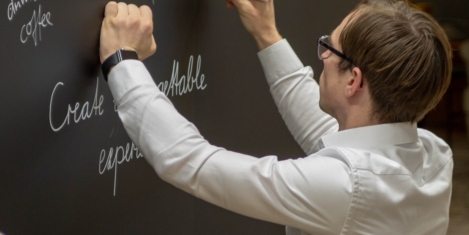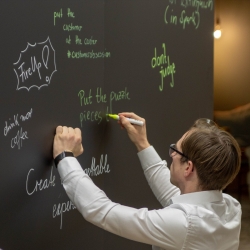To provide the best experiences, we use technologies like cookies to store and/or access device information. Consenting to these technologies will allow us to process data such as browsing behaviour or unique IDs on this site. Not consenting or withdrawing consent, may adversely affect certain features and functions.
The technical storage or access is strictly necessary for the legitimate purpose of enabling the use of a specific service explicitly requested by the subscriber or user, or for the sole purpose of carrying out the transmission of a communication over an electronic communications network.
The technical storage or access is necessary for the legitimate purpose of storing preferences that are not requested by the subscriber or user.
The technical storage or access that is used exclusively for statistical purposes.
The technical storage or access that is used exclusively for anonymous statistical purposes. Without a subpoena, voluntary compliance on the part of your Internet Service Provider, or additional records from a third party, information stored or retrieved for this purpose alone cannot usually be used to identify you.
The technical storage or access is required to create user profiles to send advertising, or to track the user on a website or across several websites for similar marketing purposes.
 One of the first research projects aimed at gauging the UK public’s attitude and responses to the coronavirus pandemic is being launched. Experts at Cardiff University and Cardiff Metropolitan University are urging people from across the UK to take part in a survey to assess how people feel about – and how they are responding to – one of the biggest health crises facing the country in recent history. (more…)
One of the first research projects aimed at gauging the UK public’s attitude and responses to the coronavirus pandemic is being launched. Experts at Cardiff University and Cardiff Metropolitan University are urging people from across the UK to take part in a survey to assess how people feel about – and how they are responding to – one of the biggest health crises facing the country in recent history. (more…)










 More than half of all strategic decisions made by directors turn out to be wrong according to
More than half of all strategic decisions made by directors turn out to be wrong according to 






 Insider data breaches are a major concern for 97 percent of IT leaders, according to new research. About three quarters believe that employees have put data at risk in the past 12 months accidentally (78 percent) or intentionally (75 percent). When asked about the implications of these breaches, more than two in five said financial damage would be the area of greatest impact.
Insider data breaches are a major concern for 97 percent of IT leaders, according to new research. About three quarters believe that employees have put data at risk in the past 12 months accidentally (78 percent) or intentionally (75 percent). When asked about the implications of these breaches, more than two in five said financial damage would be the area of greatest impact. 
 Employees use just 38 percent of their knowledge and expertise at work, meaning organisations are failing to unlock even half of the brainpower of their people, research has claimed. According to the survey of more than 1,000 UK and US “knowledge workers” by
Employees use just 38 percent of their knowledge and expertise at work, meaning organisations are failing to unlock even half of the brainpower of their people, research has claimed. According to the survey of more than 1,000 UK and US “knowledge workers” by 
 Global spending on smart cities initiatives will total about $124 billion this year, an increase of nearly a fifth on 2019, a new
Global spending on smart cities initiatives will total about $124 billion this year, an increase of nearly a fifth on 2019, a new 








March 10, 2020
A great company culture is the basis for successful flexible working
by Chris Dyer • Comment, Flexible working